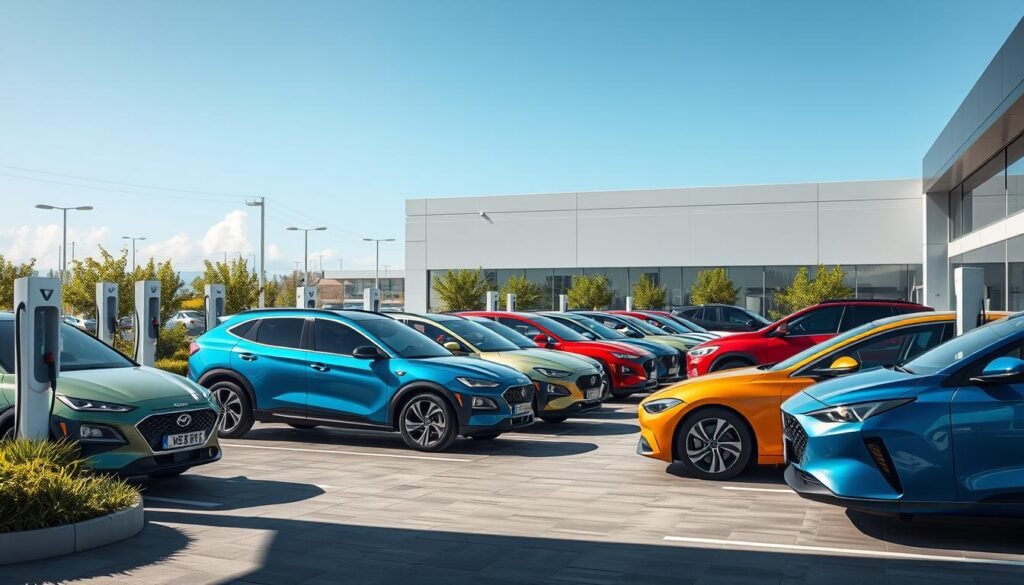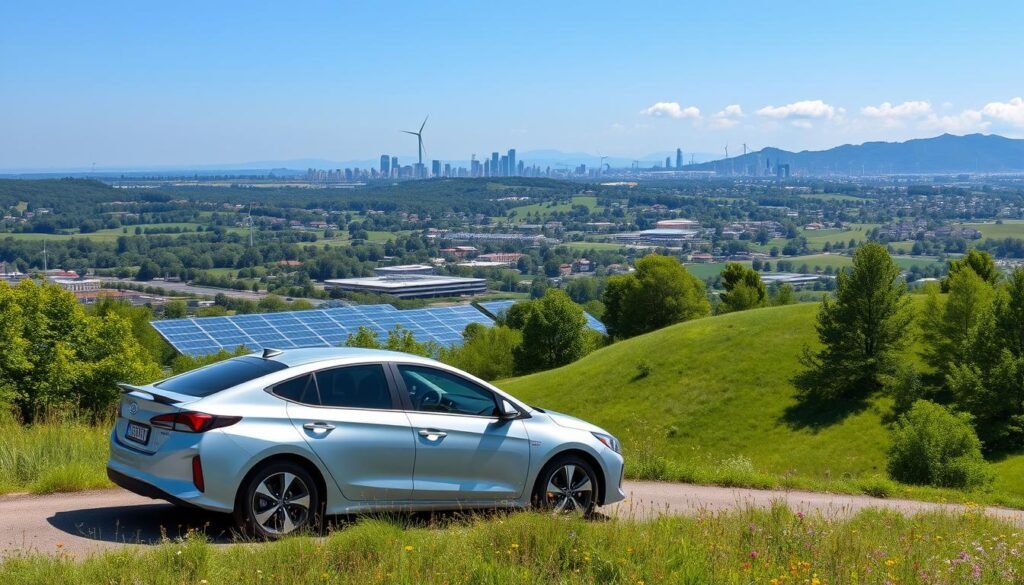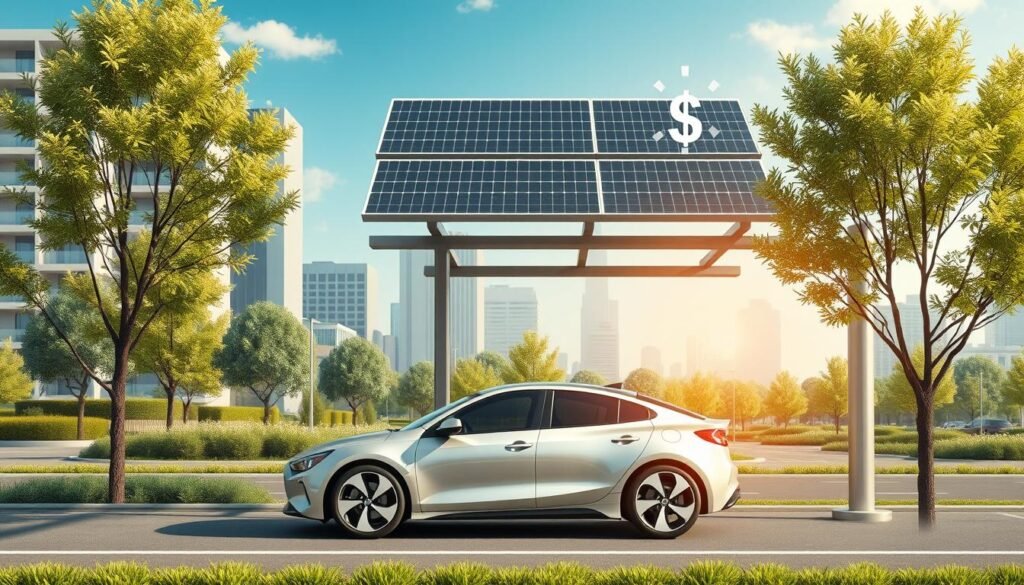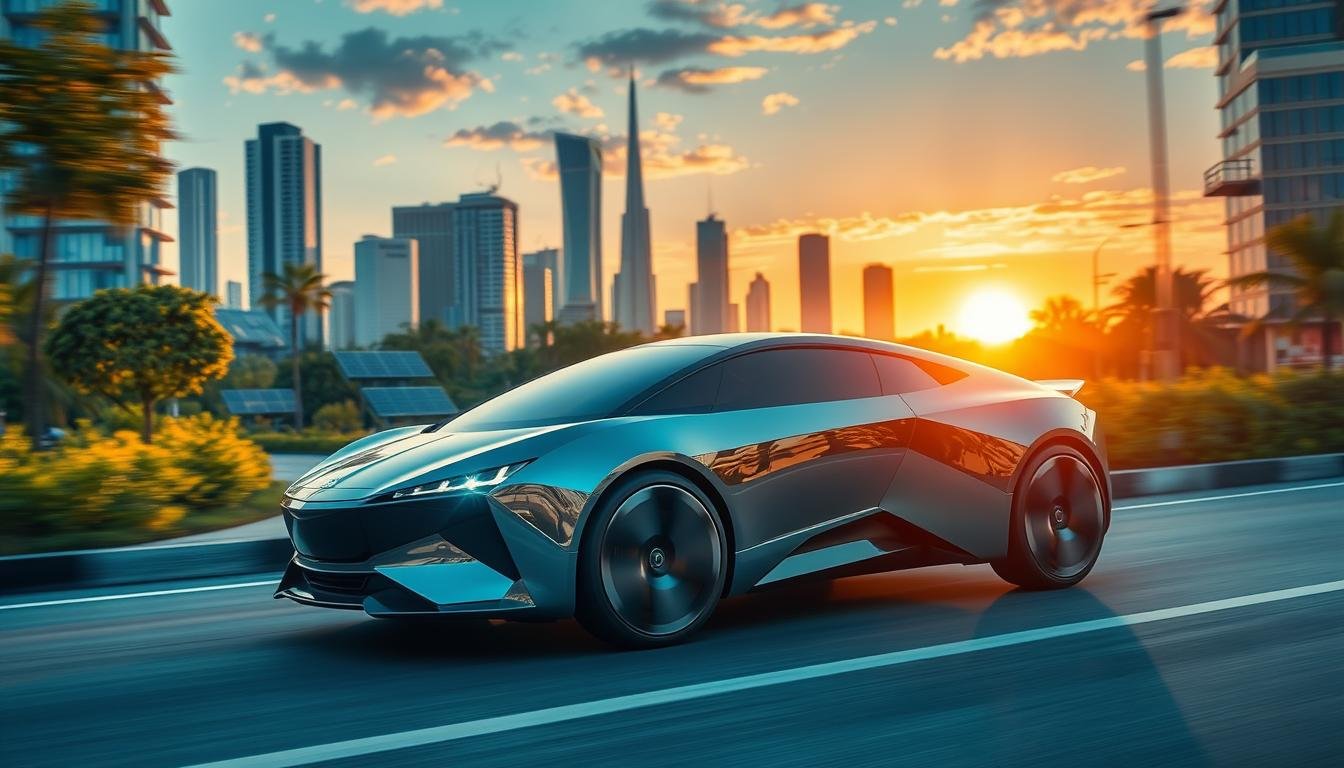Did you know that hybrid car sales have surged by 50% in the past five years? This surge reflects a growing trend towards eco-friendly driving. Hybrid cars offer a unique blend of traditional gasoline engines and electric hybrid technology. For drivers in Canada, these vehicles are not just fuel-efficient but also deliver superior performance and environmental benefits.
Hybrid cars significantly reduce fuel consumption and emissions, revolutionizing our driving habits. Their ability to seamlessly switch between electric and gasoline power makes them ideal for urban driving. This versatility is crucial in cities where frequent stops and starts are common. Hybrid cars are a crucial step towards sustainable transportation, suitable for both city commutes and longer journeys.
The automotive industry is investing heavily in hybrid technology to meet increasing demand for fuel-efficient cars. This investment not only fulfills consumer needs but also paves the way for a greener future. Curious about the future of hybrid cars? Explore this detailed guide on hybrid vehicles here.
Many buyers are also seeking cost savings. Hybrid vehicles often qualify for various incentives, making the switch more appealing. Embrace a sustainable lifestyle and discover how these incentives can benefit you here.
Key Takeaways
- Hybrid cars have increased sales by 50% in recent years, reflecting a growing trend towards eco-friendly driving.
- These vehicles combine gasoline engines with electric motors for enhanced fuel efficiency and performance.
- Reduced emissions from hybrid cars contribute to improving urban air quality.
- Government incentives make hybrid cars an economically attractive option for many drivers.
- Hybrid technology is continuously evolving, leading to better performance and value.
- Choosing a hybrid can lead to significant long-term savings in fuel costs.
Understanding Hybrid Cars
Hybrid cars embody a fusion of cutting-edge engineering and eco-aware design, attracting drivers who value both performance and environmental stewardship. These vehicles combine traditional gasoline engines with electric motors, offering a distinctive solution in the realm of fuel-efficient transportation.
Definition of Hybrid Cars
Hybrid cars are defined as automobiles that utilize more than one power source for operation. They integrate a gasoline engine with an electric motor, enhancing efficiency. This technology sets them apart from fully electric and traditional gas-powered vehicles, making them a preferred choice for those seeking eco-friendly options.
How Hybrid Cars Work
The operation of hybrid cars hinges on the synergy between the gasoline engine and the electric motor. Depending on driving conditions and energy requirements, the vehicle may draw power from either source. This dynamic interaction optimizes fuel consumption, leading to better mileage compared to conventional vehicles. Various configurations exist, including:
- Parallel hybrids: Both the gasoline engine and electric motor contribute to the vehicle’s propulsion.
- Series hybrids: The electric motor drives the wheels, while the gasoline engine acts as a generator, producing electricity.
This innovative approach not only boosts efficiency but also minimizes emissions. It aligns with the increasing demand for eco-friendly vehicles in today’s automotive market.
Benefits of Hybrid Cars
Hybrid cars offer numerous advantages, catering to the needs of contemporary drivers. One of the most significant hybrid car benefits is their outstanding fuel efficiency. By integrating traditional gasoline engines with electric power, these vehicles often achieve higher miles per gallon than standard combustion engines. This makes them a preferred choice for those looking for fuel-efficient cars.
Fuel Efficiency Explained
Fuel efficiency is a key feature that makes hybrid cars appealing to environmentally aware consumers. Many hybrid vehicles can achieve over 50 miles per gallon, depending on the model and driving conditions. For example, the Toyota Prius can reach impressive efficiency levels, allowing drivers to save significantly on fuel costs. These high efficiency rates enhance the driving experience and offer notable financial savings.
Environmental Impact
Choosing hybrid cars also has a positive environmental impact. Hybrid vehicles emit fewer greenhouse gases than traditional vehicles, aiding in the fight against climate change. This reduction in harmful emissions is crucial for promoting cleaner air and healthier urban environments. As more people opt for eco-friendly vehicles, communities can experience significant improvements in air quality, benefiting everyone.
Cost Considerations
When considering a hybrid vehicle, it’s crucial to weigh both initial costs and long-term savings. Hybrid cars often come with a higher price tag due to their advanced technology. This knowledge aids in making well-informed purchasing decisions.
Initial Investment
Hybrid cars typically demand a higher initial investment compared to traditional vehicles. This cost varies based on factors like brand, model, and additional features. Despite the initial expense, these vehicles offer substantial value. Many consumers benefit from eco-financing options, making hybrid ownership more feasible.
Long-Term Savings
Investing in a hybrid car can yield substantial long-term savings. Enhanced fuel efficiency leads to lower fuel costs, which can offset the initial price over time. Additionally, Canadian provinces offer incentives that further reduce financial burdens. This combination of savings makes hybrid vehicles an attractive option for those seeking to maximize their investment.
To delve deeper into the financial benefits of hybrid cars, explore this informative article. These advantages, coupled with potential maintenance cost reductions, underscore the growing popularity of hybrid ownership among contemporary drivers.
Hybrid Cars vs. Traditional Vehicles
Exploring the distinctions between hybrid cars and traditional vehicles uncovers several pivotal aspects, notably performance and maintenance expenses. A detailed comparison of hybrid cars sheds light on acceleration, handling, and the driving experience. These factors significantly sway a consumer’s choice.
Performance Comparison
Hybrid cars generally outperform in fuel efficiency, whereas traditional vehicles often boast more raw power. The performance spectrum encompasses:
- Acceleration: Many hybrids boast electric motors that offer immediate torque, ensuring a swift start.
- Handling: The weight distribution in hybrid cars frequently enhances handling, rendering them more agile on the road.
- Driving Experience: Hybrid vehicles typically provide a quieter ride, courtesy of the electric motor, thereby improving passenger comfort.
Maintenance Costs
Contrary to the prevailing belief, hybrid cars do not necessitate intricate maintenance. A closer look reveals that:
- Hybrid vehicles frequently share components with traditional ones, simplifying repairs.
- General maintenance intervals are often comparable, with routine services required for both types.
- Long-term, hybrid car owners may experience cost savings in maintenance due to less frequent oil changes and longer-lasting brakes.
Popular Hybrid Models in Canada
In Canada, several hybrid vehicles have gained popularity for their efficiency and diverse appeal. These models cater to various needs and preferences, making them stand out. Let’s delve into some of the top hybrid cars available today.
Toyota Prius
The Toyota Prius is renowned for its exceptional fuel efficiency, making it a top choice among hybrid car models. It boasts a spacious interior and advanced safety features. Ideal for city dwellers and families, its eco-friendly design attracts environmentally conscious consumers.
Honda Insight
The Honda Insight is another notable hybrid model. It combines a sleek design with a comfortable ride, offering a premium feel at an affordable price. Its impressive fuel economy makes it ideal for those who value both style and efficiency. The Insight also features advanced technology, appealing to tech-savvy drivers.
Ford Escape Hybrid
The Ford Escape Hybrid excels in the SUV segment, blending versatility with eco-friendly driving. It offers ample cargo space and can handle various terrains, making it perfect for adventurous families. With its hybrid technology, the Escape strikes a balance between power and fuel economy, solidifying its position as a top hybrid vehicle for practical, eco-conscious drivers.
Government Incentives and Rebates
In Canada, consumers can benefit from various government incentives and rebates when purchasing hybrid vehicles. These options can significantly lower the cost of ownership. They also encourage the adoption of eco-friendly driving choices.
Overview of Canadian Incentives
The Canadian government has implemented numerous incentives to promote hybrid car adoption. These incentives include rebates that offer immediate financial relief to buyers. The rebate amounts vary depending on the hybrid model and the province of purchase. Additionally, some local municipalities offer incentives, making it crucial to explore all available options.
By taking advantage of these government incentives for hybrid cars, consumers can contribute to a more sustainable future. They also enjoy significant savings.
How to Apply for Rebates
Applying for rebates in Canada is a simple process. Consumers must fill out application forms provided by provincial governments or municipal programs. These forms typically require basic vehicle information and proof of purchase. Here are the steps to apply:
- Research available government incentives for hybrid cars specific to your province.
- Gather necessary documents such as purchase receipts and vehicle registration.
- Complete the application form accurately, providing all required details.
- Submit the application within the stipulated timeframe to ensure eligibility.
Exploring eco-financing options can also enhance savings. Many financial institutions offer favorable rates for eco-friendly vehicles. Using these resources can maximize benefits when choosing a hybrid car.
The Future of Hybrid Technology
The automotive sector is witnessing a profound metamorphosis, primarily driven by the advent of hybrid cars and their pivotal role in emission reduction. The integration of electric hybrid technology is ushering in cutting-edge functionalities, thereby boosting performance and efficiency. These advancements not only cater to the needs of drivers but also contribute to environmental sustainability.
Innovations on the Horizon
As the clamor for eco-conscious vehicles intensifies, a plethora of innovations is poised to redefine the market. Key breakthroughs include:
- Advancements in battery technology, enabling longer driving ranges.
- Smart energy management systems that optimize power distribution.
- Integration of renewable energy sources to charge hybrid vehicles.
These electric hybrid technology innovations will not only captivate consumers but also establish new benchmarks for efficiency.
Upcoming Models to Watch
Exciting new models are on the cusp of entering the market, promising a harmonious blend of power and sustainability. Notable upcoming hybrid cars include:
- Toyota RAV4 Hybrid – Expected to feature improved fuel efficiency and advanced safety technology.
- Honda Accord Hybrid – Enhancements in driving comfort and interior technology.
- Ford Explorer Hybrid – A powerful yet eco-friendly option for families.
These models epitomize the evolving designs and capabilities in the future of hybrid cars, catering to both performance- and eco-conscious consumers. For more insights on the ongoing evolution of hybrids, check out this relevant source that elucidates why electric vehicles will coexist with hybrids in the future.
Addressing Common Myths
Hybrid vehicles are often shrouded in misconceptions, deterring potential buyers. By debunking these hybrid car myths, we aim to enhance understanding of their true benefits. Insights from experts and genuine hybrid car reviews are instrumental in dispelling these widespread beliefs.
Myth: Hybrid Cars Are Slow
The notion that hybrid cars are sluggish is a widespread myth. However, many hybrid models boast impressive acceleration and handling, aligning with today’s performance standards. The Toyota Prius and Honda Insight, for instance, exhibit acceleration times on par with traditional gas-powered vehicles. This refutes the idea that fuel efficiency comes at the expense of speed.
Myth: They Require Special Maintenance
Another prevalent myth is that hybrid cars necessitate unique maintenance, unlike conventional vehicles. In truth, the upkeep of hybrids mirrors that of gasoline-powered cars. While certain hybrid-specific components may require special attention, routine services like oil changes and tire rotations remain unchanged. This simplifies ownership, dispelling the notion that hybrids are more complex to maintain.
Choosing the Right Hybrid Car

Understanding your unique driving needs is essential when selecting a hybrid vehicle. This assessment should consider personal factors, ensuring the car aligns with your lifestyle. The subsequent sections will aid in evaluating your needs and highlight crucial hybrid car features for an enhanced driving experience.
Assessing Your Needs
Start by examining your daily driving habits. Consider how often you drive and the typical distances you cover. Assessing your commuting, weekend activities, and family trips is vital. Additionally, reflect on:
- Your budget for both purchase and maintenance costs.
- The number of passengers you usually transport.
- Storage space requirements for cargo or sports equipment.
Features to Look For
With a clear understanding of your needs, focus on key hybrid car features. Prioritize technology that boosts convenience and safety. Seek models with advanced driver-assist functions and high safety ratings. Look for:
- Battery life and charging options to suit your driving pattern.
- Fuel efficiency ratings to maximize savings at the pump.
- Comfort and technology, such as infotainment systems and connectivity options.
For more detailed guidance on the hybrid vehicle assessment process, refer to this buying guide. An informed decision guarantees your hybrid car will fulfill your expectations for years.
Charging and Refueling Hybrid Cars
Hybrid vehicles present a dual refueling approach, combining traditional gasoline with electric charging. It’s vital to grasp plug-in hybrid technology for those contemplating a hybrid switch. These cars pair a gasoline engine with an electric motor, enabling drivers to recharge via charging infrastructure or refuel at any gas station.
Understanding Plug-in Hybrids
Plug-in hybrids are distinguished by their larger battery packs, designed for external charging. This setup enhances their electric-only range, significantly reducing fuel use in city driving. The ability to operate solely on electricity for short distances makes refueling hybrid cars more efficient for daily commutes, especially in urban settings where charging stations are becoming more common.
Convenience of Gas Stations
The convenience of gas stations remains a significant advantage, despite the increase in electric charging options. Many consumers value the simplicity of refueling their hybrids at the nearest gas station, which are ubiquitous in Canada. The need for both refueling methods ensures that long trips can be planned without the stress of finding a charging station.
The hybrid market’s expansion ensures that integrating hybrids into daily life remains straightforward. When evaluating a hybrid, consider its refueling options, including gas station availability and the development of charging infrastructure. For further insights, visit this informative resource.
User-Friendly Technology in Hybrid Cars
The evolution of hybrid car technology has introduced a range of user-friendly features in hybrid cars that significantly enhance the driving experience. With advancements in dashboard displays and connectivity options, drivers can enjoy a seamless integration of information and entertainment while on the road.
Dashboard Displays
The dashboard displays in modern hybrid cars are designed to provide essential performance information at a glance. Clear visuals show fuel efficiency, battery status, and energy usage, helping drivers stay informed about their vehicle’s performance. Features such as:
- Real-time fuel efficiency monitoring
- Battery charge level indicators
- Regenerative braking feedback
These elements contribute to making driving more intuitive and engaging, empowering drivers to make informed decisions on the go.
Connectivity Features
User-friendly features in hybrid cars extend to connectivity options that enhance the overall driving experience. Integration with smartphones and navigation systems makes it easier for drivers to access crucial information. Key amenities include:
- Apple CarPlay and Android Auto compatibility
- Touchscreen displays for easy navigation
- Bluetooth connectivity for hands-free calls
Such features are particularly valued by tech-savvy individuals seeking convenience and efficiency in their daily commutes.
Environmental Benefits Beyond Fuel

Hybrid cars bring more than just fuel efficiency to the table. They significantly reduce emissions, playing a crucial role in improving urban air quality. This transition to hybrid technology is a step towards cleaner living, addressing the pollution challenges cities face.
Reduced Emissions
Hybrid cars stand out due to their lower emissions compared to traditional vehicles. They combine electric power with a gasoline engine, cutting down on greenhouse gases. This results in less carbon dioxide and pollutants, making the environment healthier.
Urban Air Quality Impact
In urban settings, the benefits of hybrid cars are particularly evident. Cities often grapple with poor air quality, leading to health issues. Hybrid vehicles, by using electric power for short trips, reduce harmful emissions in these areas. This leads to better health outcomes, promoting a sustainable urban environment.
Driving Experience in Hybrid Cars
The driving experience in hybrid cars is a unique fusion of comfort, efficiency, and innovation. These vehicles are designed to offer a smooth quiet driving experience, showcasing the impact of modern technology on car performance. Drivers can adjust their driving strategies through customizable driving modes, making each journey tailored to their needs.
Smooth and Quiet Driving
Hybrid vehicles are known for their serene ambiance. They combine electric and gasoline power to minimize engine noise. This leads to a smooth quiet driving experience, particularly in urban settings. Passengers can engage in conversations without the usual engine noise, enhancing comfort and reducing stress during commutes.
Driving Modes and Customization
Hybrid models often come with a variety of customizable driving modes. Drivers can choose settings that focus on fuel efficiency or performance, depending on the situation. For instance, eco modes aim to save energy, while sport modes boost acceleration for a more thrilling drive. This adaptability allows drivers to tailor their vehicle’s performance to suit their driving style and the environment.
Maintenance and Reliability
Owning a hybrid car presents several advantages, including the necessity for particular maintenance. Adequate maintenance ensures these vehicles operate at peak performance throughout their life span. Below are essential routine care tips for hybrid vehicle owners to maintain their cars’ optimal condition.
Routine Maintenance Tips
To maximize your hybrid vehicle’s performance, consider these routine care tips:
- Regularly check and replace the engine oil according to the manufacturer’s recommendations.
- Monitor the health of the hybrid battery and ensure it is charged properly.
- Inspect the brakes frequently, as hybrid cars often use regenerative braking.
- Keep an eye on tire pressure and tread wear for enhanced fuel efficiency.
- Schedule periodic check-ups with a mechanic familiar with hybrid technology.
Reliability Ratings
Many hybrid cars boast outstanding reliability ratings, often rivaling traditional vehicles. This high reliability of hybrid vehicles provides reassurance to new buyers, highlighting the durability and performance hybrids can offer. By investing in regular maintenance for hybrid cars, owners can significantly extend their vehicle’s life. For more detailed insights on car maintenance, check this valuable resource.
Financing Options for Hybrid Cars

When contemplating financing for hybrid cars, buyers often grapple with the choice between leasing and purchasing. It is vital to grasp the pros and cons of each path to make a well-informed decision.
Leasing vs. Buying
Leasing hybrid vehicles offers the chance to drive a new car every few years, accompanied by lower monthly payments. This option allows for access to the latest technologies and features without the burden of long-term ownership. However, it comes with limitations on mileage and potential fees for excessive wear and tear. Conversely, purchasing a hybrid car grants unlimited mileage and the freedom to customize. It also allows for building equity over time, providing a sense of ownership. Therefore, carefully evaluating these alternatives is crucial for anyone contemplating financing hybrid cars.
Availability of Eco-Financing
Eco-financing options have gained traction as more individuals seek out environmentally friendly vehicles. Financial institutions and dealerships now offer specific eco-loans with favorable terms for hybrid purchases. These programs often include reduced interest rates, grants, or rebates, encouraging the adoption of sustainable transportation. Exploring different eco-financing options can result in substantial savings, making it an appealing choice for those prioritizing environmental responsibility.
Conclusion: The Future is Hybrid
Reflecting on hybrid cars, it’s evident they represent a compelling option for today’s drivers. They boast enhanced fuel efficiency, a reduced environmental footprint, and a growing model selection. This makes the future of hybrid vehicles look bright. Adopting sustainable choices is now essential, and hybrid technology is at the forefront, merging performance with eco-friendliness seamlessly.
Embracing Sustainable Choices
The increasing interest in hybrid cars marks a shift in consumer priorities towards sustainability. By opting for a hybrid, drivers make a wise financial choice and contribute to a cleaner planet. The benefits of hybrid cars go beyond cost savings; they also reduce greenhouse gas emissions. This makes them a perfect choice for those dedicated to environmental health.
Why Hybrid Cars Make Sense for Modern Drivers
The choice to adopt hybrid technology showcases a thoughtful approach to driving. With ongoing technological advancements, hybrid vehicles meet diverse lifestyle needs, proving that eco-friendly choices can be practical. As more people understand the advantages of hybrid cars, the push for sustainable transportation grows. This sets a solid base for the future of hybrid vehicles.
